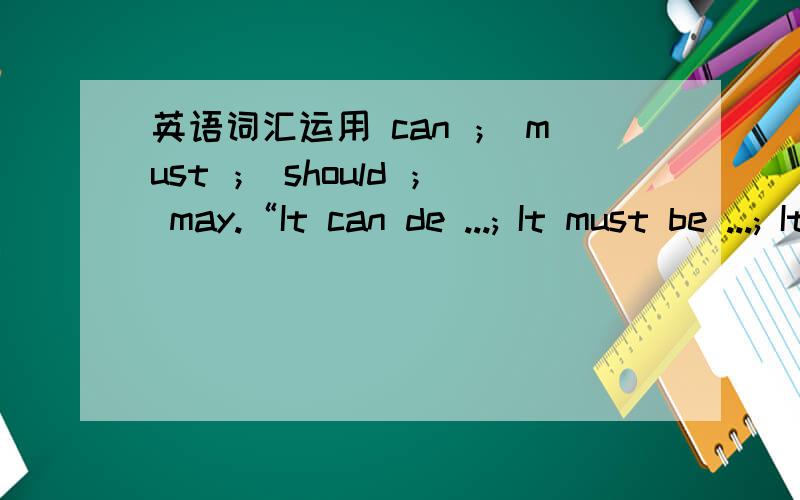英语词汇运用 can ; must ; should ; may.“It can de ...; It must be ...; It should be ...; It may be...”等词汇的运用方式及表示的可能性.最好举几个例句解析.如( )── Whose exam paper is it?── It ▁▁ b
来源:学生作业帮助网 编辑:作业帮 时间:2024/07/10 22:01:01

英语词汇运用 can ; must ; should ; may.“It can de ...; It must be ...; It should be ...; It may be...”等词汇的运用方式及表示的可能性.最好举几个例句解析.如( )── Whose exam paper is it?── It ▁▁ b
英语词汇运用 can ; must ; should ; may.
“It can de ...; It must be ...; It should be ...; It may be...”等词汇的运用方式及表示的可能性.最好举几个例句解析.
如( )── Whose exam paper is it?
── It ▁▁ be Li Lei’s.He always forgets to write his name on it.
A.can B.must C.may D.can’t
英语词汇运用 can ; must ; should ; may.“It can de ...; It must be ...; It should be ...; It may be...”等词汇的运用方式及表示的可能性.最好举几个例句解析.如( )── Whose exam paper is it?── It ▁▁ b
1.can (could)
1) 表示能力,could主要指过去时间.例如:
① Two eyes can see more than one.两只眼比一只眼看得清.
② Could the girl read before she went to school?这女孩上学前能识字吗?
2) 表示可能(理论上或是逻辑判断上).例如:,>_K
① He can’t (couldn’t) have enough money for a new car.他不可能有足够的钱买新车.
② You mustn’t smoke while you’re walking around in the wood.You could start a fire.在林子里走时勿吸烟,那样可能会引起火灾.
3) 表示允许.例如:
① Can I have a look at your new pen?我可以看一看你的新钢笔吗?
② He asked whether he could take the book out of the reading—room.他问他可不可以把书带出阅览室.
4) 表惊异、怀疑、不相信等态度.主要用于否定句、疑问句或感叹句中.例如:
① Where can (could) they have gone to?他们会去哪儿了呢?
② How can you be so careless?你怎么这么粗心?
5) 比较委婉客气地提出问题或陈述看法.例如:
① Can (Could) you lend me a hand?帮我一把好吗?.
② I’m afraid we couldn’t give you an answer today.恐怕我们今天不能给你答复.
2.may (might)
1) 表允许,might可以指过去时间,也可指现在时间,语气更委婉.例如:
① You may take whatever you like.你喜欢什么就拿什么.
② May (Might) I ask for a photo of your baby?我可以要一张你宝宝的照片吗?
在回答以may引起的问句时,多避免用这个词,而用其它方式,如Yes,please./ Certainly./ Please don’t./ You’d better not./ No,you mustn’t.等,以免显得太严峻或不客气.
2) 表可能(事实上).可以指过去时间,也可以指现在时间,但语气更加不肯定.例如:
① He may be at home.他可能在家.\
② She may not know about it.她可能不知道这件事.
must
1) 表示义务.意为“必须”(主观意志).例如:
① We must do everything step by step.我们一切都必须循序渐进地做.
② --Must we hand in our exercise books now?我们现在就要交练习本吗?
--No,you needn’t./ No,you don’t have to.不必.
4) 表示揣测.意为“想必、准是、一定”等,只用于肯定句.例如:
① He must be ill.He looks so pale.他准是病了.他的脸色苍白.
② She’s wearing a diamond necklace.She must have a lot of money.她戴着钻石项链,一定很有钱.:
3.shall
1) 表征询意见,用于第一、第三人称疑问句.例如:
① Shall I get you some tea?我给你点茶好吗?
② Shall the boy wait outside?让那男孩在外面等吗?
2) 表说话人的意愿,有“命令、允诺、警告、决心”等意思,用于第二、第三人称陈述句.例如:
① You shall do as I say.按我说的做.(命令)
② You shall have my answer tomorrow.你明天可以得到我的答复.(允诺)
③ He shall be sorry for it one day,I tell you.有一天他会后悔的,我告诉你.(警告)
④ Nothing shall stop us from carrying out the plan.什么也不能阻止我们执行这项计划.(决心)
5.should
1) 表义务.意为“应该”(某件事宜于做),用于各种人称.例如:
① You should be polite to your teachers.你对老师应该有礼貌.
② You shouldn’t waste any time.你不应该浪费时间.
2) 表推测,意为“想必一定、照说应该、估计”等.例如:
① The film should be very good as it is starring first-class actors.这部新电影是一流演员主演的,估计拍得很好.
② They should be home by now.照说他们现在应当已经到家了.
3)(表示不确定)万一.例如:
① If I should see him,I'll tell him.万一我见到他,我就告诉他.
② If it should rain tomorrow,the sports meeting would be postponed.万一明天下雨,比赛就延期举行."
B
Whose exam paper is it
这张试卷是谁的
It must▁▁ be Li Lei’s. He always forgets to write his name on it
这肯定是李雷的,他总是忘记把他的名字写上去
这类表猜测的题型里
can是可以,会,能够的意思,不会出现这个答案
回答是否定,不可能的(...
全部展开
B
Whose exam paper is it
这张试卷是谁的
It must▁▁ be Li Lei’s. He always forgets to write his name on it
这肯定是李雷的,他总是忘记把他的名字写上去
这类表猜测的题型里
can是可以,会,能够的意思,不会出现这个答案
回答是否定,不可能的(可能性为0)用can't
回答是肯定,一定是的(可能性为百分之百)用must
回答是可能是的(可能性为百分之五十之八十)用may,或might,could
收起